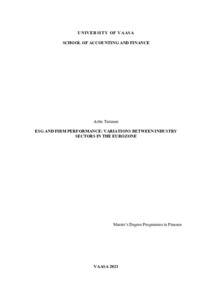ESG and firm performance: Variations between industry sectors in the Eurozone
Turunen, Arttu (2021-05-13)
Turunen, Arttu
13.05.2021
Julkaisun pysyvä osoite on
https://urn.fi/URN:NBN:fi-fe2021051329830
https://urn.fi/URN:NBN:fi-fe2021051329830
Tiivistelmä
The purpose of this thesis is to examine how the ESG performance of the listed companies in the Eurozone affects their firm value and financial performance. A large number of previously conducted academic studies have shown a positive and significant relationship between CSR engagement, firm value, and financial performance, and this thesis examines whether those findings hold in the 11 Eurozone markets. More specifically, ESG performance is proxied by Thomson Reuters ESGC score, which measures the company’s performance on non-financial environmental, social, and governance issues, combining possible ESG controversies into the measure. The used measure for firm value is Tobin’s Q and Return on Equity ratio (ROE) for financial performance. These two measures were the most used in the previous literature and hence, it is interesting to examine whether they can exhibit a positive relationship between ESG performance, firm value, and financial performance among Eurozone
companies as well.
The analyzed unbalanced panel data set consists of 793 publicly listed companies in the eleven original Eurozone countries Austria, Belgium, Finland, France, Germany, Ireland, Italy, Luxembourg, the Netherlands, Portugal, and Spain. The studied period is from 2009 to 2019. Yearly values for the ESGC score and other variables were obtained from the Thomson Reuters database. To measure the impact of firm visibility, high public awareness, and its effect on the relationship between ESG performance, firm value, and financial performance, three industry groups are formed: companies operating in the B2C sector, brand-driven companies, and environmentally sensitive companies. Their interaction with ESG performance should lead to higher firm value and better financial performance.
Empirical evidence of this thesis suggests that ESG performance does not have a positive impact on the firm value or financial performance among the Eurozone companies. The moderating effect of industries under high public awareness did not enhance these relationships and the research hypotheses were not confirmed. Out of the 20 regression specifications, only three led to statistically significant findings, but the statistical evidence was not clear enough to confirm the formulated research hypotheses. The sensitivity analysis with different firm value and financial performance measures gave additional robustness to the insignificant findings. Overall, the insignificance of the empirical findings suggests that the ESG performance does not affect the firm value or financial performance. However, it is not value destroying either and CSR engagement cannot be considered solely as a cost for the companies.
companies as well.
The analyzed unbalanced panel data set consists of 793 publicly listed companies in the eleven original Eurozone countries Austria, Belgium, Finland, France, Germany, Ireland, Italy, Luxembourg, the Netherlands, Portugal, and Spain. The studied period is from 2009 to 2019. Yearly values for the ESGC score and other variables were obtained from the Thomson Reuters database. To measure the impact of firm visibility, high public awareness, and its effect on the relationship between ESG performance, firm value, and financial performance, three industry groups are formed: companies operating in the B2C sector, brand-driven companies, and environmentally sensitive companies. Their interaction with ESG performance should lead to higher firm value and better financial performance.
Empirical evidence of this thesis suggests that ESG performance does not have a positive impact on the firm value or financial performance among the Eurozone companies. The moderating effect of industries under high public awareness did not enhance these relationships and the research hypotheses were not confirmed. Out of the 20 regression specifications, only three led to statistically significant findings, but the statistical evidence was not clear enough to confirm the formulated research hypotheses. The sensitivity analysis with different firm value and financial performance measures gave additional robustness to the insignificant findings. Overall, the insignificance of the empirical findings suggests that the ESG performance does not affect the firm value or financial performance. However, it is not value destroying either and CSR engagement cannot be considered solely as a cost for the companies.
